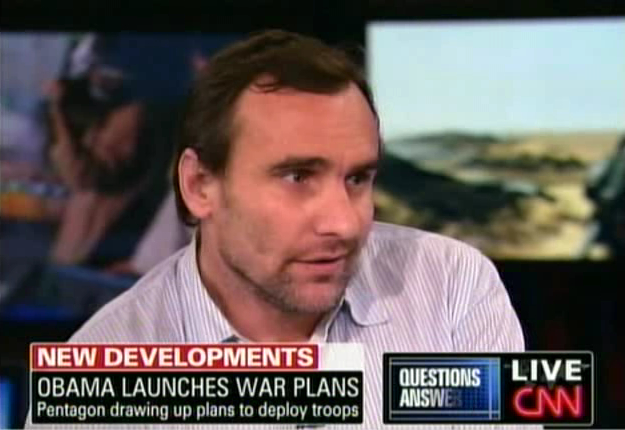CB: "America can't be bogged down. You could be there endlessly."
November 30, 2009

Length: 5:02
LARGE (58.6 MB) ----- SMALL (6.1 MB)
Campbell Brown talks with Michael and former NATO commander General George Joulwan (Ret) about what the extra troops will be able to accomplish in Afghanistan.
CAMPBELL BROWN: Tonight, President Obama's new strategy for Afghanistan is already in the works. Marching orders went out on Sunday during the president's Oval Office meeting with his top military commanders. He spent much of today informing U.S. allies abroad about the broad strokes of his decision, which, of course, comes down to more troops, basically, exactly what he promised on the campaign trail last year. Listen to this.
(BEGIN VIDEO CLIP)
SEN. BARACK OBAMA (D-IL), PRESIDENTIAL CANDIDATE: We definitely are going to need a couple of additional brigades. We need more troops there. We need more resources there.
Part of the reason I think it's so important for us to end the war in Iraq is to be able to get more troops into Afghanistan.
(END VIDEO CLIP)
BROWN: So, on the eve of the president's big speech, what is the endgame in Afghanistan?
Joining me now, CNN's Michael Ware and retired General George Joulwan, former NATO supreme allied forces commander.
Thanks so much to both of you for joining us.
General, let me start with you.
We know basically what the president is going to announce, about 30,000 more U.S. troops to Afghanistan. What's your take? Do you think the number is enough to see some sort of difference on the ground?
GENERAL GEORGE JOULWAN (RET.), U.S. ARMY: Well, I think it's important, Campbell, to not only look at the U.S. contribution, which is roughly about 30,000, but I think you're going to see some NATO contribution as well. And that's been missed in all of this.
I think it's going to be between 5,000 and 7,000, which gets you close to the 40,000 that McChrystal reported. But you're also going to see, I think, a wider strategic vision that the president is going to lay out to try to get the people, American people, to understand why we're sending more forces there.
BROWN: But expand on that a little bit and just talk to me, though, about what those troops are basically going to be tasked to do when they do go in.
JOULWAN: Well, it's going to be what is called a counterinsurgency strategy, which is going to be protecting population centers. But it's also going to be in terms of training of the police and military.
We talked last time about a functioning police force, a functioning military that can protect its borders. You are going to see a lot of emphasis being placed on that, because the Afghans are the key to this, not American troops, but Afghanis. So, you're going to see a lot of emphasis on training. And our European allies can help quite a bit here.
BROWN: And, Michael, details about what exactly is in the speech have sort of been leaking out over the last 24 hours, a lot of emphasis, we understand, on him conveying that this is not an open-ended commitment.
MICHAEL WARE, CNN CORRESPONDENT: Absolutely.
BROWN: What does that mean, though? What do conditions have to look like on the ground?
WARE: Well, America can't be bogged down. You could be there endlessly.
But, the bottom line, as we have said time and time again, militarily, you will not defeat the Taliban. So, you're looking for a political solution. For a political solution, you need partners within the Afghan government, within the enemy, as we saw in Iraq, when many of these Sunni insurgents returned from al Qaeda to the American side.
But, most importantly, the American government needs to look beyond the Afghan government. The government of Hamid Karzai will not be able to deliver.
BROWN: Well, what's the situation then? Because you say partners and basically they are relying on the Karzai government. I mean, like it or not, it's what you have got to work with.
WARE: It is. And it is what it is. It's a corrupt, riddled regime of warlords and potentates. But that's what any regime in Afghanistan is going to be. But you need to look to the tribes. You need to look to some of the old warlords who fought the Soviets.
You need people on the ground who can say, I can control my district, because from Kabul, President Karzai has a lot of trouble projecting power. So, you need allies beyond the Afghan government.
BROWN: And, General, if you will, go back to the idea of this exit strategy, the fact that we're debating it and talking about it. We had a very similar discussion surrounding Iraq, the idea that raising the prospect of an exit plan weakens our position, that the Taliban are just basically going to bide their time and wait us out.
Do you agree with that?
JOULWAN: Well, I don't think the president's going to get into sort of an exit strategy that sets any sort of timetable. I think he's going to put some benchmarks out that we will measure in a year or two, but the onus has got to be on the Afghan government.
And I really think that it's not in Kabul, but it's in the provinces that we have to make an effort here if we're going to try to have some sort of success. That's where I think the effort's going to be. And you're going to see much more in the area of training and in the area of police and military training than just chasing the Taliban.
BROWN: Michael's point as well.
General Joulwan, Michael Ware, appreciate your time. Thanks, gentlemen, so much.
